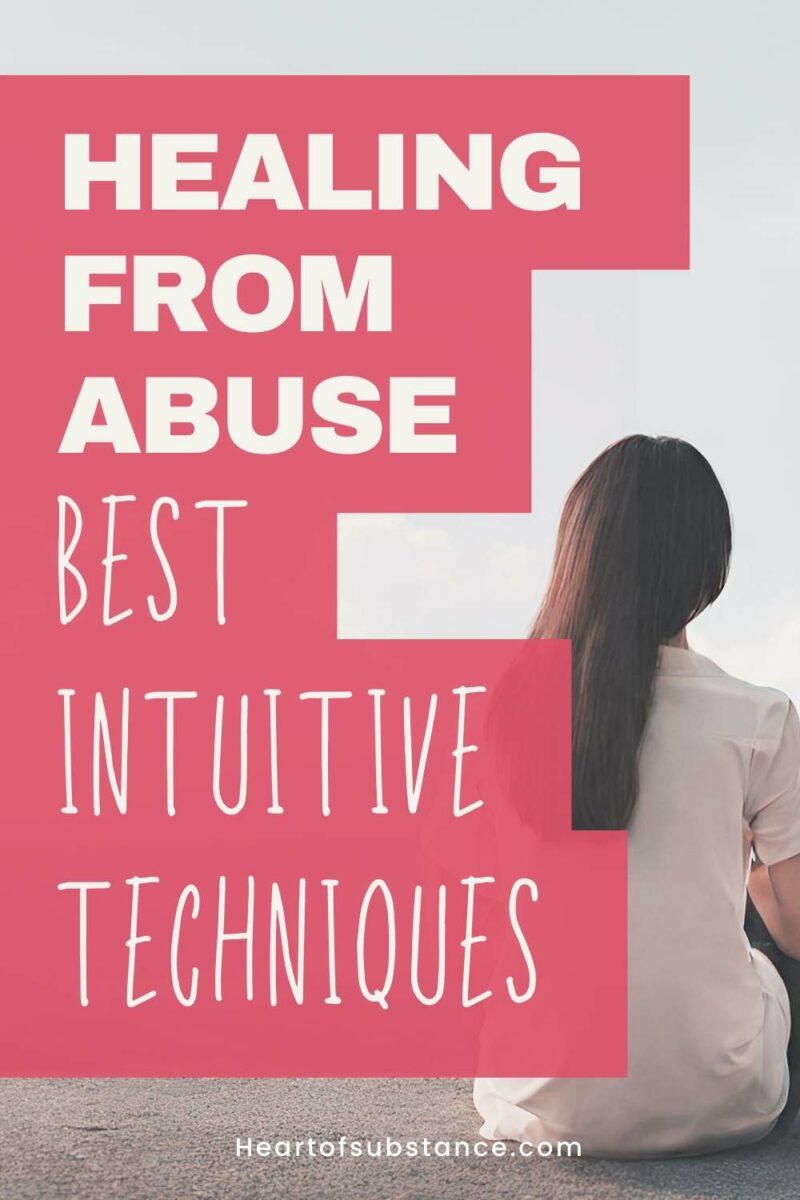You’ve suffered trauma from abuse. Time does help, but tapping into intuitive healing may further the recovery, past the damage, and onto a fulfilling life.

What is meant by healing through intuitive living? It means living in a way that aligns with your true self, your values, and beliefs, to help reinvigorate your state of being. It’s listening and trusting in your intuition.
Looking to tap into your intuition? Start with this must-read beginner’s guide.
I could hear my inner voice whispering “Peace and joy”. It was an internal tug for my life to be filled with moments of peace and joy once again.
As you become increasingly aware of your inner guidance, you’ll find ways to attract your desired goals into your life again – by living and loving intuitively.
intuitive healing techniques
By trusting my ‘gut’ and listening to my body, I developed a deeper understanding of what I needed to become whole again, to mend my broken heart and mind. Here are six techniques I’ve found tremendously helpful for this healing journey…
- Meditation
- Visualization
- Energy healing
- Journaling
- Mantras
- Tapping (or EFT)
The following is for general information purposes only. It’s not meant to replace the work of a therapist qualified in providing support and guidance for trauma recovery. Most of it is based on my observations, personal experience, and what I’ve discovered in literature.
My trauma came from covert narcissistic abuse. It was the psychological and emotional type that leaves you with a sense of confusion about your own perceptions and feelings. You find yourself questioning who you are, your memory of events, and your feelings and reactions. With it comes a sense of isolation, as friends and family members have difficulty grasping the full extent of the problem.
Other symptoms include cognitive impairment, anxiety, depression, low self-esteem, and difficulty setting boundaries. You also struggle with feelings of guilt and shame, even in situations outside the abusive past. You lack motivation for things you once enjoyed. I would describe it as feeling flat or numb.
I know I suffered some or all of these symptoms at different times and I found myself wondering “What has happened to me, that once confident person and achiever I was?”.
Meditation to help recover
Meditation is effective as it focuses your mind on the present. It calms the emotions. By observing your thoughts without judging them during meditation, you can begin to release negative emotions and cultivate a sense of inner peace.
I swear by Great Meditation, which offers a new 10-min guided meditation almost every day. I wrote about how making meditation a regular practice helps you with your day ahead.
Yoga is not unlike meditation. It’s something I also practice. I find it not only helps to alleviate physical tension but also helps to restore my wholeness.
Visualization to heal from the trauma
Visualization involves creating mental images of positive or empowering experiences. By focusing on these images, you can help yourself feel more calm, confident, and resilient.
To use visualization as an intuitive healing practice for narcissistic abuse, start by finding a quiet, comfortable place where you won’t be disturbed.
Close your eyes and take a few deep breaths, letting yourself relax.
Then, imagine yourself in a peaceful, safe environment, such as a beach or a forest. Picture yourself surrounded by healing energy and light.
Next, visualize yourself overcoming the effects of the abuse. See yourself standing tall, feeling strong, and confident. Imagine yourself surrounded by people who love and support you.
Focus on the positive feelings that come with this image, such as joy, peace, and contentment.
By using visualization regularly, I attracted positivity into my life. You too can renew yourself and move forward from the effects of narcissistic abuse.
Journaling to Overcome the effects of abuse and harm
Journaling can be a powerful tool in your journey toward recovery from the effects of narcissistic abuse.
As a survivor, you may have experienced emotional manipulation, gaslighting, and other forms of psychological abuse that have left you feeling confused, isolated, and drained.
By writing down your thoughts, feelings, and experiences in a journal, you can gain clarity, validation, and a sense of empowerment.
As you journal, try to tune in to your intuition. Your inner voice may have been silenced or suppressed by the narcissistic abuser, but it is still there, waiting to be heard.
Trust your inner voice and write down whatever comes to mind, even if it seems nonsensical or irrelevant. You may be surprised by the insights and revelations that emerge as you allow yourself to be vulnerable and authentic on the page.
Remember that rebuilding self-esteem and confidence after experiencing narcissistic abuse takes time and effort. Journaling is just one tool in your toolkit, but it can be a powerful one.
Be gentle with yourself as you explore your thoughts and feelings. If you find yourself getting overwhelmed or triggered, take a break and seek support from a trusted friend, therapist, or support group. You deserve to heal and live a life free from the effects of narcissistic abuse.
Here are some journaling prompts that might help you heal from narcissistic abuse:
Word of warning: This method is meant to be cathartic. For some folk, however, revisiting the past may be distressing — in which case proceed with caution. Do these as you feel comfortable with expressing yourself.
- What were some of the most hurtful things your abuser said or did to you?
- What were some of the ways your abuser made you question your reality or sanity?
- How did your abuser make you feel about yourself and your abilities?
- How has the abuse affected your ability to trust others?
- What are some positive qualities or strengths that you possess that your abuser may have tried to diminish or undermine?
- What are some things you would like to say to your abuser if you had the opportunity to confront them?
- How has the abuse affected your relationships with others, both romantic and platonic?
- Have you noticed any patterns in the types of people you tend to attract in relationships? If so, what are they?
- What are some healthy coping mechanisms or self-care practices that have helped you in your healing journey?
- What are some affirmations or positive self-talk that you can use to counteract any negative self-beliefs that may have resulted from the abuse?
Remember, journaling can be a powerful tool in healing from trauma and abuse. Take your time with each prompt, and be gentle with yourself as you navigate your healing journey.
Energy healing to help rebuild self-esteem and confidence
Energy healing techniques such as Reiki and acupuncture address energy flow in the body, and can help balance your energy and release energetic blockages.
In Reiki, the practitioner uses their hands to channel energy into the recipient’s body, helping to clear blockages and promote healing.
To do this, the practitioner must be able to sense where the energy is needed and how much energy should be applied. This requires a keen sense of intuition, as well as an understanding of the body’s energy systems.
After my Reiki sessions, I always experience a sense of calm and peace.
Similarly, acupuncture works by stimulating specific points in the body to promote the flow of energy, or “qi”. Acupuncturists must be able to sense the energy imbalances in the recipient’s body and determine which points to stimulate to restore balance. This also requires a strong intuition and a deep understanding of the body’s energy systems.
Remember, healing from narcissistic abuse is a journey, and it is important to be patient and compassionate with yourself as you work towards recovery.
By incorporating these methods into your resilience-building tool kit, you can begin to cultivate a sense of peace and empowerment that will help you to move forward and thrive.
Mantras to focus and calm the mind
Mantras are simple phrases or words that are repeated, either out loud or internally, as a way to focus and calm the mind.
When you’re feeling overwhelmed or anxious, repeating a mantra can help you quiet the negative thoughts and replace them with positive, healing energy.
Some examples of mantras that may be helpful for survivors of narcissistic abuse include:
- “I am enough”
- “I am worthy of love and respect”
- “I release the pain of the past and embrace a brighter future”
If you’re new to using mantras, it may take a little practice to get comfortable with the technique. Set aside some time each day to sit quietly and repeat your chosen mantra.
You may find it helpful to focus on your breath as you repeat the words or to visualize yourself surrounded by healing light. With time and practice, you’ll begin to feel the positive effects of this powerful tool, and you’ll be well on your way to healing from the trauma of narcissistic abuse.
For people like me seeking peace and joy here are 7 mantras to attract “peace” and “joy”:
- “I am worthy of peace and joy, and I choose to let go of any negativity from my past.”
- “My inner peace and joy cannot be taken away by anyone else’s actions or words.”
- I cultivate peace and joy within myself, and I attract positive energy into my life.”
- I release all fear and anxiety, and I allow peace and joy to fill my heart and mind.
- “I am deserving of love, peace, and joy, and I embrace these emotions with open arms.”
- “I choose to focus on the present moment and find peace and joy in the small things in life.”
- “I am grateful for the peace and joy in my life, and I choose to nourish these feelings every day.”
You have been through a lot. Surviving narcissistic abuse is no easy feat, and it’s understandable if you’re still feeling the effects after dealing with a narcissist. Take time to tune in to your inner voice to help yourself recover.
Tapping
Tapping is a common name given to the emotional freedom technique (EFT).
Emotional Freedom Technique (EFT) combines ancient Chinese acupressure with modern psychology.
What you do is tap on specific meridian points on the body while focusing on a particular issue or emotion.
I highly recommend Brad Yates for guided tapping and to learn more about this powerful technique.
When it comes to healing from narcissistic abuse, EFT can be particularly effective as it can address both the emotional and physical aspects of trauma.
Tapping can help reduce the intensity of negative emotions, such as fear, anger, and shame, allowing you to regain a sense of control and empowerment. It can help rewire your brain’s response to triggers associated with the abuse, and so offers you an opportunity to heal and become resilient.




